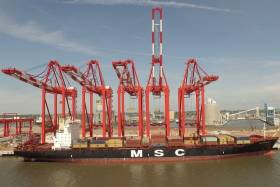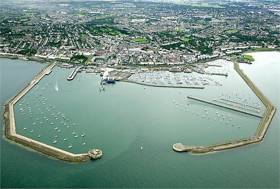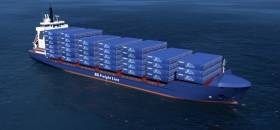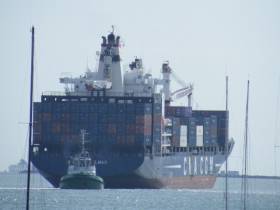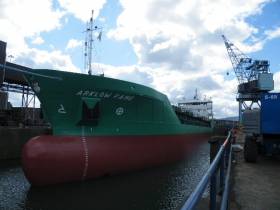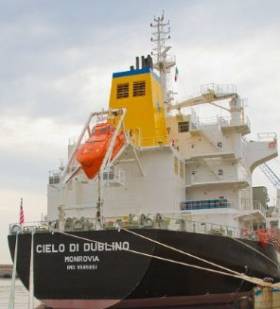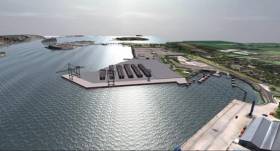Displaying items by tag: Shipping Review
Shipping Review: Foggy Arklow Launch, DFDS Celebrate 150th, Brexit ‘Special Port Zones’ & Sligo Harbour Traffic Up
#ShippingReview - Jehan Ashmore reviews the shipping scene from among the following stories of recent weeks.
Particularly foggy conditions took place at the launch of Arklow's newest dry-cargo vessel, Arklow Valour in The Netherlands. This is the fourth Eco-Trader 5,150dwt ship built of 10 ‘V’ series ordered.
Ferry and freight giant, DFDS celebrated its 150th anniversary, the Danish-owned operator includes container feeder links between Ireland, Belgium and Netherlands through subsidiary DFDS Logistics.
In response to potential administrative complications from Brexit, the British Ports Association (BPA) has called for UK government to classify ports as ‘special port zones’.
Short-sea operator Scotline acquire tonnage as Scot Leader joins fleet that are regular Wicklow Port callers. Both operator and port are heavily engaged in trading timber cargo.
Arundo is one of 18 cargoships so far in 2016 that docked in Sligh Harbour an increase of 18% in traffic compared to last year.
Chris Hazzard, Ports Minister Northern Ireland says a new departmental ‘Brexit Planning Team’ has actively engaged with Lisahally (Foyle Port) London/Derry since the end of summer.
Shipping Review: IMO Agree Global Sulphur Cap, Brexit to Be Vicious, Liverpool2 Opens & New ESPO Chairman
#ShippingReview - Jehan Ashmore reviews the shipping scene from among the following stories over the last fortnight.
The International Maritime Organisation IMO reach agreement to maintain deadline of 2020 for introducing global cap of 0.5% sulphur content in marine fuels.
At the All-Island Civic Dialogue on Brexit, Taoiseach Enda Kenny has forecast “vicious” negotiations over Brexit. The forum follows the issue of Irish ports where the UK proposed to transfer frontline immigration controls to avoid enforcing a ‘hard border’ between the North and the Republic.
Liverpool2, a £400 million deep-water container port officially opened as an ocean gateway for the UK and connecting services to Ireland. The Port of Liverpool terminal is capable of handling ‘mega’ containerships, and has a catchment of over 35 million people, almost 58% of the UK’s population.
The European Sea Ports Organisation (ESPO) has elected Eamon O’Reilly as Chairman for the next four years. Earlier this year ESPO held their annual conference for the first time in Dublin which was hosted by the port company in which O’Reilly has been serving as Chief Executive since 2010.
Shipping Review: Exports to UK Fall €300m, Dun Laoghaire Transfer ‘Imminent’ & IMDO Appointments
#ShippingReview - Jehan Ashmore reviews the shipping scene from among the following stories over the last fortnight.
Irish exports to the UK were €9.5bn in the first eight months of 2016, a fall of €300m for same period last year according to the Central Statistics Office (CSO).
Operators of a chemical and products tankers, Ardmore Shipping select the UK P&I Club as its second P&I club.
In the Seanad, Minister for Transport Shane Ross has said the transfer of Dún Laoghaire Harbour Company to the local council is ‘imminent’.
The Irish Maritime Development Office (IMDO) has made two new appointments to the organisations key management team.
Shipping Review: Exports €140bn Ahead of Brexit, Irish Ports to Avoid ‘Hard Border’ & Ardmore Appointment
#ShippingReview - Jehan Ashmore reviews the shipping scene from among the following stories over the last fortnight.
In the 'Top 150 Born in Ireland' report, according to the Irish Exporters Association (IEA) the leading largest indigenous companies in that sector generated around €140bn in turnover last year.
The UK Government proposed to transfer frontline immigration controls to Irish port and airports, in measures to avoid enforcing a Brexit ‘hard border’ between the North and the Republic.
Ardmore Shipping Corporation appoints new Financial Controller, Jorge Lavin. The company operates a fleet of chemical and product tankers.
Shipping Review: Multicat at Mooneys, BG's New Irelanders, Wicklow Port Transfer & More
#ShippingReview - Jehan Ashmore reviews the shipping scene among the following stories over the last fortnight.
Multicat workboat, Sgt Pepper which carried out mooring duties for the RNLI Dun Laoghaire during the summer, underwent maintenance at Mooney Boats, Killybegs, Co. Donegal.
Container operator, BG Freight Line orders new class of ‘Ireland’ max tonnage optimised for the company’s Irish Sea hub feeder services.
Minister for Transport, Shane Ross has signed an Order transferring Wicklow Port Company to Wicklow County Council, the first port to transfer under the National Ports Policy.
Irish Continental Group (ICG) container subsidiary Eucon and terminal divisions, increased first-half year revenue by 9.8% to €62.8 million (2015: €57.2 million).
Arklow Shipping's shipbuilding spree to replace ageing tonnage has led to one of the oldest ‘R’ class short-sea cargoships, Arklow Rose disposed to UK owners based in Cardiff, Wales.
Shipping Review: Ex US Army Craft Assists Aran Islands, New UK Minister Visits Liverpool2 & More
#ShippingReview - Jehan Ashmore reviews the shipping scene from recent weeks.
The cargsoship that transported generators to restore electricity supply to two of the Aran Islands, Afloat has identified as a former US Army landing craft vessel, MV Chateau-Thierry, which operates a roll on / roll-off freight service to and from Rossaveel, Co. Galway.
The UK Government's new Transport Minister visited Peel Ports £400m Liverpool2 deep-water container terminal development, which will enhance services to and from Ireland with onward global connections.
Arklow Beacon assisted in ABP's Port of Ipswich in the UK to achieve a record one million tonnes of grain in the 2015/16 harvest year, a new total for the Essex port and its customers.
European shipping and logistics operator, DFDS Group, raised its outlook for 2016, as second quarter freight volumes were up 33%. In the UK & Ireland alone, DFDS Logistics units in Q2 increased by 43.2% compared to 2015
Shipping Review: Tugs Overhaul in Donegal, Fraudulent Certificates, Peel Ports Award & More
#ShippingReview - Jehan Ashmore reviews the shipping scene from among the stories of the last fortnight.
A pair of tugs were overhauled at Mooney Boats, in Killybegs, Co. Donegal, from where supertrawlers based in the premier fishing port will no longer be able to use the larger facility of Dublin Graving Docks that closed in late April.
Department of Transport, Tourism and Sport (DTTAS) has become aware of possible fraudulent Irish seafarer certificates, and fraudulent website, which purports to verify such fraudulently issued seafarer certification.
Croke Park will host the third Atlantic Stakeholder Platform Conference on promoting entrepreneurship and innovation in the Atlantic Area on 27 September.
Owner and developer of Liverpool2 container terminal, Peel Ports Group awarded Logistics Business of the Year at this year's 'Multimodal' in Birmingham. The group operates MTL Terminal in Dublin Port, where Maersk Line has launched recently a new service linking both Irish Sea ports and to Spain.
Irish Continental Group (ICG) has issued Q1 financial results for 2016. Consolidated Group revenue in the period was €91.4m, an increase of 7.4% compared with last year. Net debt at the end of April was €25.9m compared with €44.3m at 31 December 2015.
#ShippingReview - Jehan Ashmore reviews the shipping scene over the last fortnight.
Containership Antwerp called to Dublin on Maersk Group’s first direct call to the capital on a new Seago Line operated UK-Ireland-Spain service.
The ship is a sister of Maersk Alabama which Somali pirates hijacked in 2009. The story was made into a film 'Captain Phillips' played by actor Tom Hanks.
M.V. Ireland launched in the Netherlands, has no connections with the Irish shipping industry, however the newbuild is noteworthy given the vessel is one of the first dry cargoships to be powered by (LNG) liquefied natural gas.
All “shippers” as from July 2016 must declare to the carrier in advance the verified weight of packed containers.
Arklow Fame (90m) on Wednesday became the final ship to depart the country’s largest dry-dock (200m) in Dublin that officially closed yesterday. The unique strategic facility of Dublin Graving Docks Ltd had employed a skilled workforce of 26 at the Alexandra Basin site which is to be redeveloped.
The demise of the ship-repairer and engineering facility marks the end of a era in this chapter of the Irish maritime industry with the exception of Cork Dockyard, now the largest in the state.
The 2,998 tonnes Arklow Fame, one of the smaller vessels to use Dublin dry-dock, has since Thursday berthed at the Bulk Jetty within Alexandra Basin. Cargo transported by train from Boliden Tara Mines (ore for zinc and lead) was loaded on board the leadship of 10 'F' class Spanish built sisters.
The cargoship yesterday departed for Odda, Norway.
Shipping Review: Arklow's First ‘Valiant’, d’Amico’s 'Green' Award, 2015 A 'Success' for Irish Ports & More
#ShippingReview - Jehan Ashmore reviews the shipping scene over the last fortnight.
Arklow Shipping's third Bodewes built 5,150dwt Trader, Arklow Valiant was launched as the first in the company’s 50th year to bore that name. The cargsoship features a new bow differing to her sisters completed at the same Dutch yard.
Around €1 million is been spent at Dun Laoghaire Harbour on repairs and maintenance on the popular amenity of the East Pier and on the Carlisle Pier where only small cruiseships can berth.
d'Amico Group, the Italian company which has a dry-cargo subsidiary headquartered in Dublin, has won 'Green Shipowner of the Year' at an award held in the Danish capital, Copenhagen.
The Irish Maritime Transport Economist report for 2015 has been a successful year for the maritime industry. The annual publication is issued by the Irish Maritime Development Office (IMDO).
Cargoships loaded in Scotland docked in Rosslare Europort, where the outlook in the timber trade is for further growth at the ferryport.
Shipping Review: ICG’s 2015 Results, MEP's Vote in Port Regulation, Tenders for Cork's €100m Terminal
#ShippingReview – Jehan Ashmore reviews the shipping scene over the last fortnight.
Container and ferry operator, Irish Continental Group released preliminary results for 2015 which reported positive operational and financial performance building upon the continued Irish economic recovery.
Danish logistics and shipping operator DFDS are to double intermodel rail capacity between Port of Waterford and Ballina, Co. Mayo.
The European Parliament’s Transport committee of voted in favour on the Port Regulation and the Fleckenstein Report. 451 MEPs voted in favour, 234 MEPs voted against, while 18 MEPs abstained.
A date for tenders for the €100 million redevelopment of the Port of Cork's Ringaskiddy container terminal are to be received no later than next Wednesday, 23 March.
Royal Bodewes latest shipyard, to be named Arklow Valiant features a different bow compared to her sisters. Both the fore and aft sections of the cargoship were joined together at the Dutch yard.
The largest ever con-ro built, Atlantic Star of 100,530 tonnes (off Anglesey) and future G4 sisters will operate on ACL's Europe-North American (Halifax, Canada) service which is to be maintained in a new deal to 2022.


























